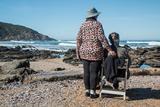Cancer Related Pain Management from a Palliative Care Perspective

Cindy Kelly, FNP-BC, ACHPN, and Vineeta Rao, PharmD, BCPS, review opioid and nonopioid treatment options for cancer-related pain. Their presentation addresses patients with cancer and substance use disorder and also cancer patients that are in remission, but who still present with persistent pain.
Category
- Patient Centered Care
Format
- Self-study / Enduring
Credits
- 1.00 ACPE Pharmacist
- 1.00 ACPE Pharmacy Tech
- 1.00 CTR
- 1.00 NCPD/CNE
- 1.00 Participation
The Umbrella and the Kitchen Table: Providing Safe, Supportive Care for Cancer Patients

Introduction and discussion of supportive care programs in a "home away from home" for patients during their cancer journey.
Category
- Patient Centered Care
Format
- Self-Paced, Online Courses
Credits
- 1.00 ACPE Pharmacist
- 1.00 ACPE Pharmacy Tech
- 1.00 CTR
- 1.00 NCPD/CNE
- 1.00 Participation
Oncologic Emergencies - SPOC

Jacob Stein, MD, MPH, reviews several of the most common medical emergencies that arise when caring for patients with cancer. We highlight key aspects of presentation, diagnosis and management, with pearls for clinicians along the way.
Category
- Patient Centered Care
Format
- Self-Paced, Online Courses
Credits
- 1.00 ACPE Pharmacist
- 1.00 ACPE Pharmacy Tech
- 1.00 AMA PRA Category 1 Credit™
- 1.50 ASRT
- 1.00 CTR
- 1.00 NCPD/CNE
- 1.00 Participation
Solid Organ Transplantation and Skin Cancer

Puneet Singh Jolly, MD, PhD discusses keratinocyte neoplasms are by far the most common malignancy in the world. While surgical treatments remain the most common and most effective therapy, there are numerous emerging non-surgical techniques. We discuss these and the rationale for using such treatments, particularly in specific challenging clinical scenarios.
Category
- Patient Centered Care
Format
- Self-Paced, Online Courses
Credits
- 1.00 ACPE Pharmacist
- 1.00 ACPE Pharmacy Tech
- 1.00 AMA PRA Category 1 Credit™
- 1.00 ASRT
- 1.00 CTR
- 1.00 NCPD/CNE
- 1.00 Participation
Integrating the Caregiver as a Member of the Multidisciplinary Care Team - SPOC

Erin Kent, PhD, MSc, and Loretta Muss, RN, BA, discuss how to recruit the caregiver into the patient’s plan of care and understanding the role and the stresses of being an oncology caregiver.
Category
- Patient Centered Care
Format
- Self-Paced, Online Courses
Credits
- 1.00 ACPE Pharmacist
- 1.00 ACPE Pharmacy Tech
- 1.00 CTR
- 1.00 Participation
Making Exercise and Wellness Part of the Cancer Experience SPOC

This lecture will provide education on the safety and benefit of exercise during and after cancer treatment, resources that we have available at UNC and how you can help your patients implement exercise and wellness behaviors during and after their treatment.
Category
- Patient Centered Care
Format
- Non-Credit Course
Credits
- 1.00 Participation
Interprofessional Collaboration in Caring for Adults with Cancer SPOC

In this presentation, Dr. Bryant will share strategies in collaborating with team members in both the inpatient and outpatient settings to optimize cancer care.
Category
- Patient Centered Care
Format
- Non-Credit Course
Credits
- 1.00 Participation
Testicular Cancer SPOC

Testicular cancer is the most common cancer in young men. We will discuss different aspects of this cancer from diagnosis, treatment options, and post-treatment survivorship.
Category
- Patient Centered Care
Format
- Non-Credit Course
Credits
- 1.00 Participation
Pet Therapy in Oncology SPOC

Lyn Filip, RN, BSN, OCN will provide an introduction into the benefits of Pet Therapy in a clinical oncology setting. The presentation will include certification process, training, policies and the story of "Herbie the Therapy Basset."
Category
- Patient Centered Care
Format
- Non-Credit Course
Credits
- 1.00 Participation
Early Detection of Colorectal Cancer: Don’t Get Left Behind “45 is the new 50” SPOC

More than ever before, there are rising cases of colon and rectal cancers among young people. Updated recommendations have lowered the age of screening to age 45 from standard age of 50.
Category
- Patient Centered Care
Format
- Non-Credit Course
Credits
- 1.00 Participation

 Facebook
Facebook Twitter
Twitter LinkedIn
LinkedIn Forward
Forward